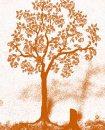The Wall
A new play by Douglas Watkinson, based on his own experiences, takes us on an emotional journey to a British military cemetery in Ramleh, Israel. There, frustration, anger and the need to find answers bubble together forcing a mild-mannered, British vet to examine his attitude to the socio-political conflict between the Israelis and the Palestinians.
David (played by Eric Carte) is visiting the cemetery where his father, Ralph (Duncan-Clyde Watkinson) was buried after being blown up by a terrorist bomb in 1947. Though he's now in middle age, David senses a vacuum in his life - the space where his father might have played an influential part had he not died in the service of the British Army at the age of 25. We first meet David wandering around the cemetery, trying to make sense of the map which details the locations of graves. When David finds his father's grave, he understandably breaks down. At that moment, his father appears and starts telling the audience that the cemetery is getting more visitors and that most of them, like David, find their emotions getting the better of them. But that's not all that's on Ralph's mind. He wants his son to write a letter to the Israeli authorities to try to remove the wall (more formally known as the West Bank Barrier) which the Israelis built to keep out Palestinian suicide bombers. Ralph wants to keep the caretaker - Mahmood - looking after the cemetery, and the barrier means he has to go miles out of his way to get to his place of work at the cemetery and, along the way, has to suffer delays and insults from Israeli army personnel.
The situation we are presented with is unusual. It's a kind of role-reversal, because the father, Ralph, is younger and less experienced than his own son. However, thanks to well-written dialogue, and highly convincing performances from both actors, there's never a sense of the concept becoming ridiculous. I don't think we're meant to take the situation realistically. The proposition is more like David considering what his father might have thought and what action he might have expected of him.
Duncan-Clyde Watkinson's interpretation of a corporal in the British Army of the 1940s, might be considered somewhat stereotypical, but nonetheless incorporates authenticity and I found it highly believable, reminding me of an ex-army sergeant I once worked with. Eric Carte's David is just as convincing, particularly in his moving breakdown when he finds his father's grave, and when rage overcomes him when he has spent the night with Mahmood's Palestinian family. Both actors are excellently supported by Olivia Rowe's careful pacing, and sensitive direction.
This is a kind of 'goldilocks' script with well-structured scenes, that are neither too long, nor too short. And the overall length of the play is sufficient to get the points across without the construct becoming wearing. Douglas Watkinson's play does contain some powerful and controversial statements about the Israelis and their tactics in dealing with the Palestinians, which will not find universal favour. But these are issues which need to be aired and debated. There's not nearly enough politically-focused, thought-provoking drama on the London stage. So it's refreshingly rewarding to see something which poses questions about a protracted conflict which many of us ordinary people in the West find confusing as well as unacceptable, and where the actions of the Israelis - symbolised here by 'the wall' - seem to inflame, rather than dampen the volatility of the conflict. Like David in the play, we can't solve the problems, but what 'The Wall' does is to at least raise and release our frustrations and anger. Well-worth seeing.
Originally published on
